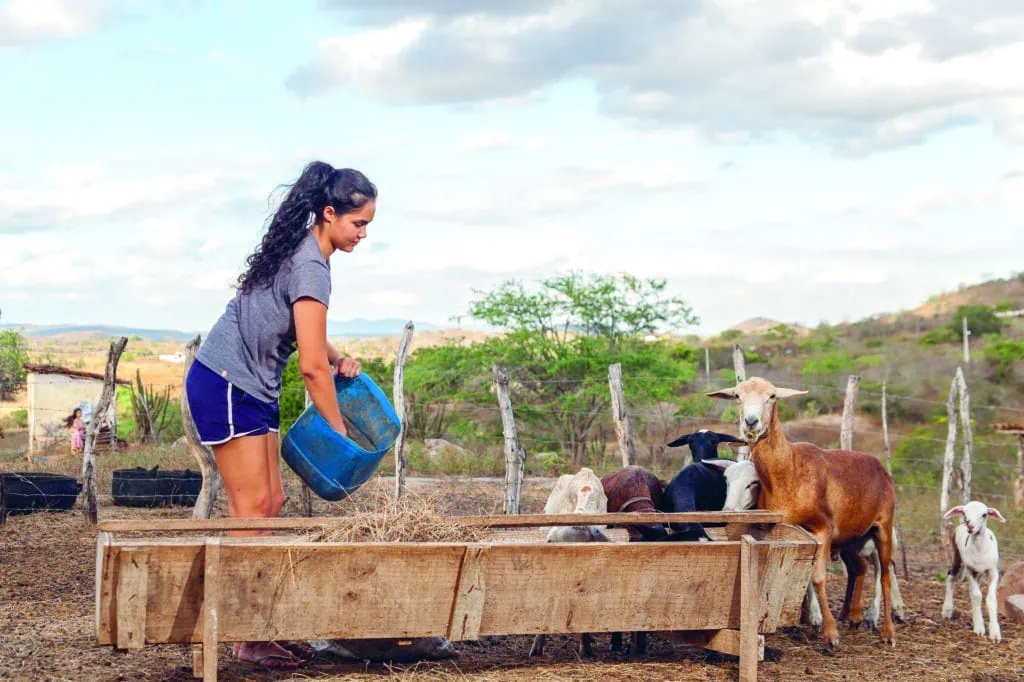In Brazil, the gap between rich and poor is wide. In the state of Paraíba in the northeast of the country, the situation for young people from smallholder families is desolate. Our partner organization ASPTA supports them in building a dignified life at home.
Rafaela de Azevedo Teófilo's life took a special turn when she drew the right lot in a competition. At an event organized by our partner organization, the 18-year-old was surprised: she won a Morada Nova sheep. "I would never have guessed how much the animal has grown on me today," says the young woman. She decided to keep the sheep, to raise animals from now on and to take responsibility: "I started raising an animal that was really mine. Then I participated in several trainings to learn more about animal health and husbandry." She is visibly fulfilled by her new occupation, and when the day dawns, she immediately checks on the sheep every morning. Rafaela lives in her house with her parents, two brothers and a niece, and her mother and father work as farmers. "We produce three types of beans, corn, pumpkins and also millet, which we use to make animal feed in the dry season. Currently, we raise chickens, sheep and also cattle." With her own sheep farm, Rafaela contributes to the family's well-being. She takes care of her animals independently, feeds and cares for them, takes the sheep to pasture and to the barn. Her dream is to devote herself even more intensively to animal husbandry: "I would like to continue my way in Rafaela contributes to the well-being of the family with her sheep breeding. farming because it's what I like to do," Rafaela says joyfully. And she is still grateful today for the lot she has drawn.
A dignified life
Thanks to our partner organization ASPTA and the training programs, young people like Rafaela can build a dignified life in their homeland. In ASPTA's youth organizations, the young women and men acquire knowledge in environmentally friendly, economically profitable agriculture and learn to sell their products profitably. They support each other in their endeavors. In this way, they are strengthened in their smallholder identity and encouraged to play an active role in shaping their future and regional politics. Another example is Herick Menezes do Nascimento, who is involved in the family farm in his daily life. Together with his mother, the 20-year-old plants corn, beans, ornamental plants, fruit trees and native plants. "Everything we produce on the property with my mother is for family consumption," Herick says. He lost his father when he was three years old and now lives alone with his mother after his sister moved to Rio de Janeiro. "We live on my father's pension and our income from farming. Besides that, I also have a small income from producing seedlings that I sell in the nursery."
Together with other young people
Herick particularly likes the collective work within the nursery: "I work there together with other young smallholders. We plant vegetables and divide the tasks among us. Every day, one of us is responsible for taking care of the plants. As a group, we sell the seedlings and thus have a small income of our own as young farmers." As a result of his work, Herick now has a very different perspective on the environment than he did before. Since joining a cooperative of young small farmers* in the state of Paraíba, he feels really good. "We are politically active because the climate policies of today determine the future prospects of the young generation. Together we defy the power of agribusinesses and their monocultures. We rely on organic farming and do without pesticides. We need our healthy food and seedlings for our own supply or sell them. This also gives us an income." Young smallholders like Herick make an important contribution to poverty reduction and to environmental and climate protection. His greatest wish is to gain further qualifications in order to professionalize the production of seedlings. But most of all, he wants to continue working with the group of like-minded and committed young people and work for a more environmentally conscious world. At first, Dayane das Dores Monteiro de Araújo could not imagine a future on the land. Today, she lives as a young farmer with her husband in the countryside of Esperança. She is 22 years old and has been married for two years. Her husband and she make a living from farming, producing corn, beans, fava beans and cotton. They both also sell the livestock they raise together. Dayane has been active in the local youth movement since 2018 and is still involved there today. "Before I knew the youth movement here in the countryside, I always thought I had to go to the city to secure my future. Today, however, I know that I can also live well in the countryside. The youth movement is therefore of great importance to me."
An existence in the homeland
One of the highlights of the youth project is the Solidarity Fund, where she is currently involved and coordinates the youth and women's groups. "My biggest wish for the future is to enlarge the area around our house and build a chicken coop with wire mesh." This is necessary because their chickens have already been attacked by predators such as foxes. There is a lack of water resources on her property, so she would also like to have a 16000 liter cistern in the future to meet her family's needs. Dayane is full of hope and grateful that she can provide for her family's income on her land together with her husband.
Author: Valerie Wendenburg, Media and Communication at terre des hommes switzerland


